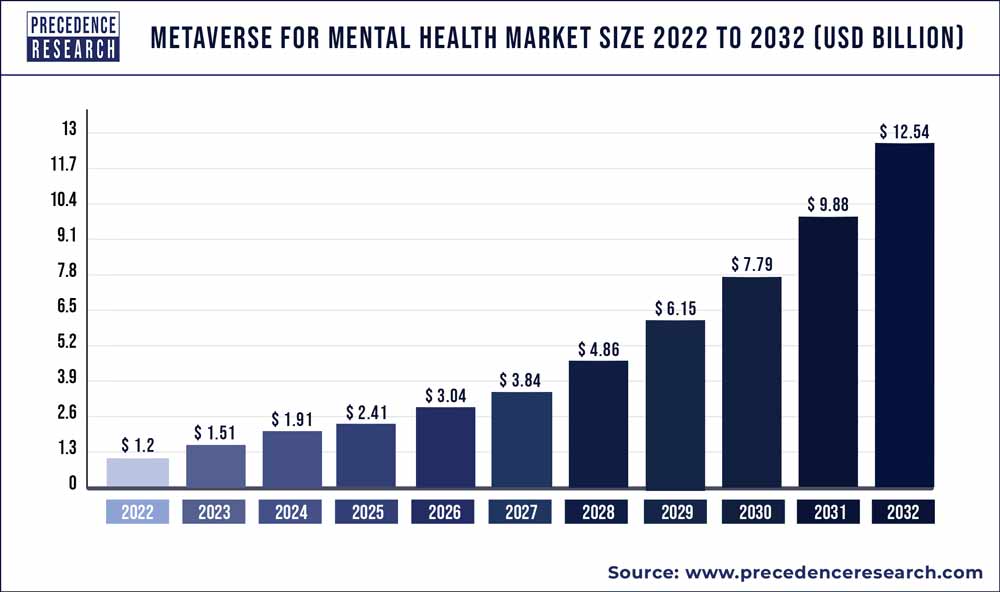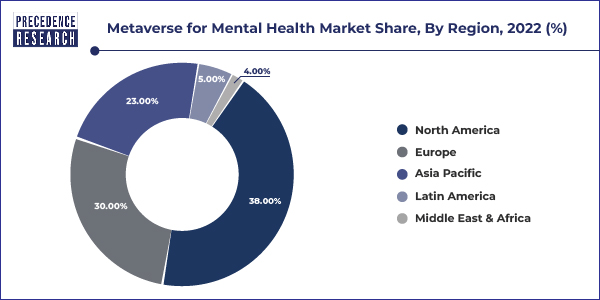Metaverse for Mental Health Market Will be USD 12.54 Million by 2032
The global metaverse for mental health market size reached USD 1.51 billion in 2023 and is expected to be worth around USD 12.54 billion by 2032 with a CAGR of 26.50% from 2023 to 2032.

Key Takeaways
- North America contributed more than 38% of revenue share in 2022.
- Europe region is estimated to expand the fastest CAGR between 2023 and 2032.
- By component, the hardware segment has held the largest market share of 65% in 2022.
- By component, the software segment is anticipated to grow at a remarkable CAGR of 28.4% between 2023 and 2032.
- By application, the therapy and counseling segment generated over 68% of revenue share in 2022.
- By application, the mental health education segment is expected to expand at the fastest CAGR over the projected period.
- By technology, the Virtual Reality (VR) segment has held the largest market share of 52% in 2022.
- By technology, the Augmented Reality (AR) segment is anticipated to grow at a remarkable CAGR over the projected period.
- By end-user, the healthcare institutions segment had the largest market share of 49% in 2022.
- By end-user, the mental health professionals segment is expected to expand at the fastest CAGR over the projected period.
The Metaverse for Mental Health market is experiencing a transformative surge, seamlessly blending technological innovation with the imperative of mental well-being. This emergent landscape amalgamates virtual reality, augmented reality, and interactive platforms to offer novel therapeutic solutions. As individuals increasingly seek digital spaces for mental health support, the Metaverse becomes a promising frontier, fostering a new era of accessible and personalized mental health interventions.
Region Snapshot
The adoption and growth of the Metaverse for Mental Health vary across regions. In technologically advanced regions such as North America and Europe, a mature digital infrastructure and higher awareness contribute to a more rapid uptake of Metaverse-based mental health solutions. Asia-Pacific, on the other hand, is witnessing a significant surge, driven by a burgeoning tech-savvy population and increasing awareness about mental health issues.

Local regulatory landscapes and cultural attitudes towards mental health also play a crucial role in shaping the market dynamics. Governments and healthcare authorities in different regions are navigating the regulatory framework to ensure the ethical use and widespread accessibility of Metaverse technologies for mental health support.
Metaverse for Mental Health Market Scope
| Report Coverage | Details |
| Growth Rate from 2023 to 2032 | CAGR of 26.50% |
| Market Size in 2023 | USD 1.51 Billion |
| Market Size by 2032 | USD 12.54 Billion |
| Largest Market | North America |
| Base Year | 2022 |
| Forecast Period | 2023 to 2032 |
| Segments Covered | By Component, By Application, By Technology, and By End User |
| Regions Covered | North America, Europe, Asia-Pacific, Latin America, and Middle East & Africa |
Growth Factors:
Several factors contribute to the robust growth of the Metaverse for Mental Health market. Firstly, the demand for remote mental health services has surged, driven by the need for accessible and convenient solutions. The immersive nature of the Metaverse provides a unique environment for therapeutic interventions, ranging from virtual therapy sessions to mindfulness experiences. Additionally, the integration of artificial intelligence algorithms tailors interventions to individual needs, enhancing the efficacy of mental health support within the Metaverse.
Moreover, collaborations between technology companies and mental health professionals fuel innovation, bringing forth a diverse range of applications that cater to specific mental health challenges. As awareness about the potential benefits of Metaverse-based mental health solutions grows, a broader societal acceptance is driving increased adoption, further propelling the market forward.
By Component:
The Metaverse for Mental Health Market encompasses various essential components that collectively contribute to its functionality. Primarily, it involves the development and integration of immersive virtual environments, avatars, real-time communication tools, and advanced sensory technologies. These components work in tandem to create a seamless and engaging virtual space where individuals can interact and address mental health concerns. The backbone of this segment lies in the continuous evolution and integration of cutting-edge technologies to enhance user experience and therapeutic outcomes.
By Technology:
The technological landscape of the Metaverse for Mental Health Market is dynamic and ever-evolving. It integrates augmented reality (AR), virtual reality (VR), artificial intelligence (AI), and machine learning (ML) to create an immersive and personalized user experience. These technologies work synergistically to simulate real-world scenarios, provide personalized therapeutic interventions, and analyze user data to enhance the efficacy of mental health interventions. As the technology continues to advance, the Metaverse for Mental Health remains at the forefront of innovation, promising continuous improvement in treatment modalities.
By Application:
The applications of the Metaverse for Mental Health extend across a diverse range of therapeutic interventions. From immersive therapy sessions and support groups to personalized wellness programs, the Metaverse serves as a versatile platform for addressing various mental health challenges. Furthermore, it plays a pivotal role in preventative measures, offering mindfulness experiences, stress reduction techniques, and educational resources. The adaptability of the Metaverse allows it to cater to individual needs, making it a powerful tool for mental health professionals and users alike.
By End User:
The end-user segment of the Metaverse for Mental Health Market is multifaceted, catering to a broad spectrum of individuals and organizations. Mental health professionals, including therapists and counselors, leverage the Metaverse as a tool for delivering virtual therapy sessions and interventions. Individuals seeking mental health support, ranging from those dealing with stress and anxiety to more severe conditions, benefit from the accessibility and anonymity provided by the virtual environment. Additionally, organizations and institutions implement the Metaverse for employee well-being programs, creating a holistic approach to mental health within the workplace.
In summary, the Metaverse for Mental Health Market is a dynamic ecosystem that relies on innovative components, diverse applications, cutting-edge technology, and a wide range of end users to create a comprehensive and effective platform for addressing mental health challenges.
Recent Developments
- In 2022, GE Healthcare (US) partnered with MediviewXR (US) to co-create the OmnifyXR medical imaging system. This collaboration is dedicated to advancing medical imaging technology, potentially transforming how healthcare professionals interact with and utilize medical data for diagnosis and treatment.
- In 2023, NVIDIA Corporation (US) and Microsoft (US) joined forces to bridge Microsoft 365 apps with NVIDIA Omniverse. This collaboration aims to enable digital transformation, facilitate industrial metaverse integration, and empower the training of advanced generative AI models, among other applications.
Metaverse for Mental Health Market Players
- Facebook, Inc. (Meta Platforms, Inc.)
- MindMaze
- Relax VR
- Psious
- XRHealth
- Limbix
- Virtue
- PsycApps
- VRChat
- vSpatial
- Ovation VR
- Oxford VR
- Tribeca Care
- Luminous Cities
- Floreo, Inc
Segments Covered in the Report
By Component
- Hardware
- Software
- Service
By Application
- Therapy and Counseling
- Mental Health Education
- Mindfulness and Meditation
- Others
By Technology
- Virtual Reality (VR)
- Augmented Reality (AR)
- Mixed Reality (MR)
By End User
- Individuals
- Mental Health Professionals
- Healthcare Institutions
- Others
By Geography
- North America
- Europe
- Asia-Pacific
- Latin America
- Middle East and Africa
Contact Us:
Mr. Alex
Sales Manager
Call: +1 9197 992 333
Email: sales@precedenceresearch.com
Web: https://www.precedenceresearch.com
Blog: https://www.expresswebwire.com/
Blog: https://www.uswebwire.com/
Blog: https://www.dailytechbulletin.com/
Blog: https://www.autoindustrybulletin.com/
